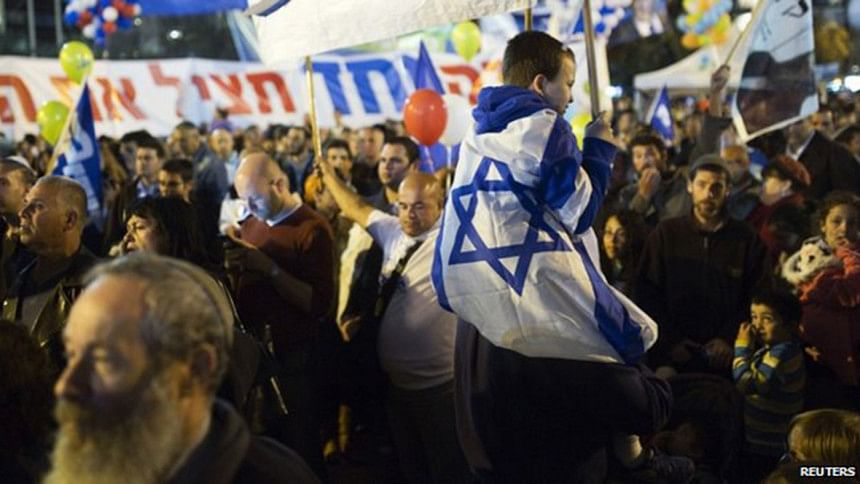Netanyahu battles for fourth term

Voting is under way in Israel in what is expected to be a close race between Prime Minister Benjamin Netanyahu's party and a centre-left alliance.
The centre-left Zionist Union promises to repair relations with Palestinians and the international community.
Netanyahu, whose party has trailed in opinion polls, vowed on Monday not to allow the creation of a Palestinian state if he wins a fourth term.
The economy and living standards have emerged as key issues.
Polls opened at 07:00 (05:00 GMT) and are due to close at 22:00.
Results could be declared soon afterwards, but a lengthy period of negotiations over the formation of the next coalition government may follow.
No party has ever won an outright majority under Israel's proportional representation voting system, and neither side is expected to get more than a quarter of the votes in Tuesday's election.
Netanyahu, 65, fired two key ministers late last year, accusing them of undermining the government, and called early elections to try to form a more stable coalition.
Opinion polls published before the weekend suggested that the Zionist Union was likely to win the most seats, though it may still be possible for Netanyahu to form a coalition government even if his Likud party fails to top the poll.
As Netanyahu cast his vote on Tuesday, he ruled out forming a coalition with the Zionist Union.
"There will not be a unity government with Labour. I will form a nationalist [right-wing] government," he said.
He also posted a video message on his Facebook page, saying: "Right-wing rule is in danger. Arab voters are going to the polls in droves. Left-wing organisations are bringing them in buses."
Zionist Union leader Yitzhak Herzog said his rival represented the "path of despair and disappointment".
"Whoever wants change, hope, and really a better future for Israel, will vote the Zionist Camp," he said.
The main players
- Benjamin Netanyahu: Victory for his Likud party could mean a fourth term for the veteran of Israeli politics. His hawkish stance on the Palestinians and Iran have made him popular with the right but a divisive figure.
- Yitzhak Herzog: The co-leader of the centre-left Zionist Union electoral alliance, Herzog has accused Likud of depressing Israeli living standards and campaigned against Netanyahu's foreign policy. He has tried to counter Netanyahu's accusations he is "soft" by pointing to his special forces background.
- Tzipi Livni: Herzog's co-leader in the Zionist Union, Ms Livni is a prominent advocate of seeking more cooperation with the Palestinian Authority.
- Moshe Kahlon: A former Likud welfare and communications minister under Benjamin Netanyahu, Kahlon's centre-right Kulanu party could play kingmaker in a coalition.
Who are the key candidates?
By 12:00 voter turnout stood at 26.5%, roughly the same as the figure for last election in 2013, the Central Elections Committee reported.
Many of the candidates have concentrated on Israel's socio-economic problems, including the high cost of living and slow economic growth.
The prime minister has consistently accused his centre-left challengers of being willing to relinquish Israel's claim to Jerusalem as its indivisible capital in peace talks with the Palestinians.
On Monday, he made his pledge to prevent the creation of a Palestinian state in a speech at the Har Homa Jewish settlement in East Jerusalem.
Palestinians seek East Jerusalem - occupied by Israel since the 1967 Middle East war - as the capital of a future Palestinian state.
Another term for Netanyahu would mean more scepticism on a peace deal with Palestinians and a strong focus on strategic security issues like Iran's nuclear threat, the BBC's Kevin Connolly reports from Jerusalem.
Herzog has accused Netanyahu of "panicking".
Visiting the Western Wall, one of the holiest sites in Judaism, on Sunday, he pledged to "safeguard Jerusalem and its residents in actions, not just words, more than any other leader".

 For all latest news, follow The Daily Star's Google News channel.
For all latest news, follow The Daily Star's Google News channel. 



Comments